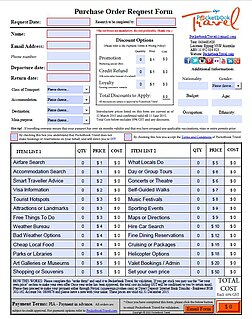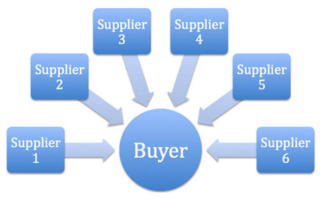
In commerce, supply-chain management (SCM), the management of the flow of goods and services, involves the movement and storage of raw materials, of work-in-process inventory, and of finished goods from point of origin to point of consumption. Interconnected or interlinked networks, channels and node businesses combine in the provision of products and services required by end customers in a supply chain. Supply-chain management has been defined as the "design, planning, execution, control, and monitoring of supply-chain activities with the objective of creating net value, building a competitive infrastructure, leveraging worldwide logistics, synchronizing supply with demand and measuring performance globally."
SCM practice draws heavily from the areas of industrial engineering, systems engineering, operations management, logistics, procurement, information technology, and marketing and strives for an integrated approach. Marketing channels play an important role in supply-chain management. Current research in supply-chain management is concerned with topics related to sustainability and risk management, among others. Some suggest that the “people dimension” of SCM, ethical issues, internal integration, transparency/visibility, and human capital/talent management are topics that have, so far, been underrepresented on the research agenda.

Sales are activities related to selling or the number of goods or services sold in a given time period.
A hire purchase (HP), known as installment plan in North America, is an arrangement whereby a customer agrees to a contract to acquire an asset by paying an initial installment and repays the balance of the price of the asset plus interest over a period of time. Other analogous practices are described as closed-end leasing or rent to own.
Procurement is the process of finding and agreeing to terms, and acquiring goods, services, or works from an external source, often via a tendering or competitive bidding process. Procurement is used to ensure the buyer receives goods, services, or works at the best possible price when aspects such as quality, quantity, time, and location are compared. Corporations and public bodies often define processes intended to promote fair and open competition for their business while minimizing risks such as exposure to fraud and collusion.

A purchase order (PO) is a commercial document and first official offer issued by a buyer to a seller indicating types, quantities, and agreed prices for products or services. It is used to control the purchasing of products and services from external suppliers. Purchase orders can be an essential part of enterprise resource planning system orders.
A term of business proposal is a written offer from a seller to a prospective buyer.
Business proposals are often a key step in the complex sales process—i.e., whenever a buyer considers more than price in a purchase.
Purchasing refers to a business or organization attempting to acquire goods or services to accomplish its goals. Although there are several organizations that attempt to set standards in the purchasing process, processes can vary greatly between organizations. Typically the word “purchasing” is not used interchangeably with the word “procurement”, since procurement typically includes expediting, supplier quality, and transportation and logistics (T&L) in addition to purchasing.
A buyer is any person who contracts to acquire an asset in return for some form of consideration.
Complex sales, also known as Enterprise sales, can refer to a method of trading sometimes used by organizations when procuring large contracts for goods and/or services where the customer takes control of the selling process by issuing a Request for Proposal (RFP) and requiring a proposal response from previously identified or interested suppliers. Complex sales involve long sales cycles with multiple decision makers. Multiple stakeholders and stakeholder groups contribute to every complex sale.
A blanket order, blanket purchase agreement or call-off order is a purchase order which a customer places with its supplier to allow multiple delivery dates over a period of time, often negotiated to take advantage of predetermined pricing. It is normally used when there is a recurring need for expendable goods. Blanket orders are often used when a customer buys large quantities and has obtained special discounts. Based on the blanket order, sales orders and invoice items can be created as needed until the contract is fulfilled, the end of the order period is reached or a pre-determined maximum order value is reached.
The term supply management, also called procurement, describes the methods and processes of modern corporate or institutional buying. This may be for the purchasing of supplies for internal use referred to as indirect goods and services, purchasing raw materials for the consumption during the manufacturing process, or for the purchasing of goods for inventory to be resold as products in the distribution and retail process.
Industrial market segmentation is a scheme for categorizing industrial and business customers to guide strategic and tactical decision-making. This especially is important in sales and marketing, as well. While government agencies and industry associations use standardized segmentation schemes for statistical surveys, most businesses create their own segmentation scheme to meet their particular needs, however.
Materials management is a core supply chain function and includes supply chain planning and supply chain execution capabilities. Specifically, materials management is the capability firms use to plan total material requirements. The material requirements are communicated to procurement and other functions for sourcing. Materials management is also responsible for determining the amount of material to be deployed at each stocking location across the supply chain, establishing material replenishment plans, determining inventory levels to hold for each type of inventory, and communicating information regarding material needs throughout the extended supply chain.
Procurement is the process of finding, acquiring, buying goods, services or works from an external source, often via a tendering or competitive bidding process. The process is used to ensure the buyer receives goods, services or works the best possible price, when aspects such as quality, quantity, time, and location are compared. Procurement is considered sustainable when organizations broadens this framework by meeting their needs for goods, services, works, and utilities in a way that achieves value for money and promotes positive outcomes not only for the organization itself but for the economy, environment, and society. This framework is also known as the triple bottom line.

Government procurement or public procurement is the procurement of goods, services and construction on behalf of a public authority, such as a government agency. With 10 to 20% of GDP, government procurement accounts for a substantial part of the global economy.
A chief procurement officer (CPO) is an executive role focused on sourcing, procurement, and supply management for an enterprise.
Global sourcing is the practice of sourcing from the global market for goods and services across geopolitical boundaries. Global sourcing often aims to exploit global efficiencies in the delivery of a product or service. These efficiencies include low cost skilled labor, low cost raw material and other economic factors like tax breaks and low trade tariffs. A large number of Information Technology projects and Services, including IS Applications and Mobile Apps and database services are outsourced globally to countries like Pakistan and India for more economical pricing.
Buying agents or purchasing agents are people or companies that offer to buy goods or property on behalf of another party. There are agents for all kinds of products, from raw material commodities through to specialized custom equipment.

In the retail industry, a buyer is an individual who selects what items are stocked. Buyers usually work closely with designers and their designated sales representatives and attend trade fairs, wholesale showrooms and fashion shows to observe trends. They may work for large department stores, chain stores or smaller boutiques. For smaller independent stores, a buyer may participate in sales as well as promotion, whereas in a major fashion store there may be different levels of seniority such as trainee buyers, assistant buyers, senior buyers and buying managers, and buying directors. Decisions about what to stock can greatly affect fashion businesses.

A reverse auction is a type of auction in which the traditional roles of buyer and seller are reversed. Thus, there is one buyer and many potential sellers. In an ordinary auction, buyers compete to obtain goods or services by offering increasingly higher prices. In contrast, in a reverse auction, the sellers compete to obtain business from the buyer and prices will typically decrease as the sellers underbid each other.







